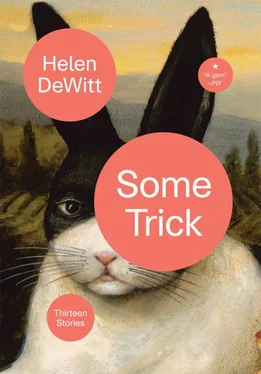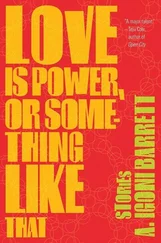I thought, This sounds interesting, I’ll look at that. But it was very bizarre, you know, it had a translation on the facing page and they had put it into civilized grammatical French. You could see what it was supposed to mean right away. But in the Greek most of the time you couldn’t really see, you had to try to make it mean something because the words crammed so much in or left so much out or maybe just barely touched what the dictionary said they meant and just barely touched the grammar and just. I thought that this author had tried to let unspeakable things do something to the language and then M. Levecque had tidied it up again. I looked at this polite little sentence & sat crying on the bed —
— All the same, the Funeral March for a Dead Parrot
— No, not at all, that’s precisely
— But many people
— Exactly
— But surely
— On the contrary
For the next thirty years Morhange was one of the most celebrated pianists in the world.
In 1975 he retired to Japan, & by coincidence took a house on the very island, in the very town where Mlle Matsumoto lived.
— Why Japan?
— Japan had fascinated me for a long time — the prints of Utamaro and Hokusai and Hiroshige — those remarkable little poems, the haiku — it is an art of subtraction, an art with a horror of the extraneous, but it’s not so much that it has a horror of the extraneous as that it avoids histrionics, Western art gives the impression by contrast of being saturated with sincerity —
It was pointed out that his greatest triumphs had been with Rachmaninov, Tchaikovsky —
— Yes, exactly, it’s precisely for that reason that Japanese art really struck me. As a young man I had nothing but contempt for the Fossil, an old man who in the first place understood nothing of the works he pretended to teach, who was flattered by the deference he received from Mlle Matsumoto, something which a Japanese — and a young girl at that — accords so readily to a teacher. What I did not see at the time was that there was something genuine in her performance —
What happened you see was that, when I had spent many years in America, someone happened to play me a recording of Mlle Matsumoto playing Chopin’s fourth Ballade. This was the very piece with which I had won the Prix d’Orphée. I was astonished by a performance which seemed to anticipate so much of the last twenty years, & in justice to myself I listened to the recording I myself had made at that time. I was filled with contempt. If Delacroix could have played the piano, this theatrical display is precisely what he would have produced —
Hearing Mlle Matsumoto’s recording I now saw the quality I had been unable to see before, that she had escaped the fatal plunge into egotism which the idiocy of the Fossil forced upon all his pupils of any talent, & had extracted something better from within herself —
I finished my tour — I went to Tokyo — c’était affreux — I thought that the true Japan was elsewhere — I crossed the sea to Shikoku, an island with 88 Buddhist shrines — I had my Steinway brought from Paris, as well as an old pedalier which I had managed to pick up —
I discovered that it was here that Mlle Matsumoto still lived. I remembered my behavior & could not approach her.
For eight years I lived in this town without meeting her. I knew where she lived, for once walking I heard the fourth Ballade & there could not have been two to play it in such a place. Thereafter I avoided the street.
One day after walking in the country I came back & walked down her street — I heard the opening bars of Chopin’s fourth Ballade in F minor. More than ever was I conscious that I had wronged her — I felt that I must apologize — in agony I walked up and down outside the door, waiting for her to finish — double octaves in the bass melted into the air in a legato of the most perfect unhurried simplicity — I saw suddenly an insuperable difficulty. It is regarded in Japan as a common politeness to take off the shoes on entering a house — but I have always been careless of clothes, I remembered suddenly that that morning I had not been able to find any socks, that I had put on a blue and a red, each with a large hole at the big toe — I could not appear to Mlle Matsumoto like this. Like a madman I ran through the streets of Tokushima, I found a shop, I bought a pair of socks, in my mind I heard the Ballade approaching the arpeggiated chords before the end, I flung down a few yen & ran off, I darted into the precincts of a nearby shrine — no one in sight — I took off my shoes & the old socks, bundled the latter into a pocket, put on the new, put on my shoes, dashed to the house of Mlle Matsumoto. She had come to the moment of stillness before the final explosion. It came to an end — gathering my courage I knocked — she came to the door — I must speak to you, I said, you must allow me to apologize — she gestured for me to enter — I removed my shoes & followed her — we entered the room with the piano — I stood before her, every word of Japanese left my head, I poured forth my reflections of a decade & when I paused she said
Vous êtes très aimable, M. Morhange, mais ce n’est point à moi que vous devez addresser vos louanges,
& she gestured toward the piano.
C’est mon élève que vous venez d’entendre,
& she introduced me to a twelve-year-old boy who bowed without speaking.
I stammered something, bowed & left — just after me the boy burst from the house & ran down the street — & now Chopin’s fourth Ballade came again from the house — but I could not go back.
The following week I received a note from Mlle Matsumoto asking me to take on Murakami as a pupil.
Keith was not the songwriter. Darren and Stewart wrote the songs. Keith hit things, some of which were drums. He came in one day with a song and nobody wanted to play it.
The song was the least of their problems. They had signed with a label, so their music was used in adverts and that, it brought in some dosh, they were shameless rock sluts because the fans downloaded the songs for free. Slutdom was not the issue. The issue was that the contract would not let them do independent gigs.
Keith had had an argument with them because the Arctic Monkeys, look at the fucking Arctic Monkeys, why the fuck can’t we do what the fucking Arctic Monkeys, this being the capacity for inarticulate rage which had made him a drummer in the first
And Darren and Stewart, being songwriters, had talked and talked and talked and talked to the point that there were signatures on the contract.
Then the inconceivable had happened which is that Thom Yorke sent an e-mail inviting them to do a gig. Keith said they should just do it, fuck the fucking contract but Darren and Stewart
So then Keith was very quiet.
Never a good sign.
Given Keith’s known propensity to hit things other than drums.
So Darren said they would record the song.
Keith tried to explain his concept and Darren and Stewart kept arsing about and then Sean the keyboardist sussed that it was an arsing about session and then Keith put down his sticks.
Darren, Stewart and Sean sussed that the beat was gone.
Keith, says Darren. What the fuck.
Keith disengaged from the scaffolding of things that could be hit that made noise. He stood up.
He walked across the floor while Darren, Stewart and Sean varied the theme of What the fuck. He took the mic from Darren.
In addition to not being a songwriter Keith was not a singer. He dragged the lyrics of the song over reluctant vocal cords and spat them into the mic.
Fucking great man said Darren who did not want another guitar percussioned to subatomic particles against wall, floor, chair, his head. Yeah fucking great said Stewart who had also lost 3 guitars and Sean hastened to protect his keyboard from berserk drummer syndrome, Fucking great, insane, totally fucking crazy man
Читать дальше












